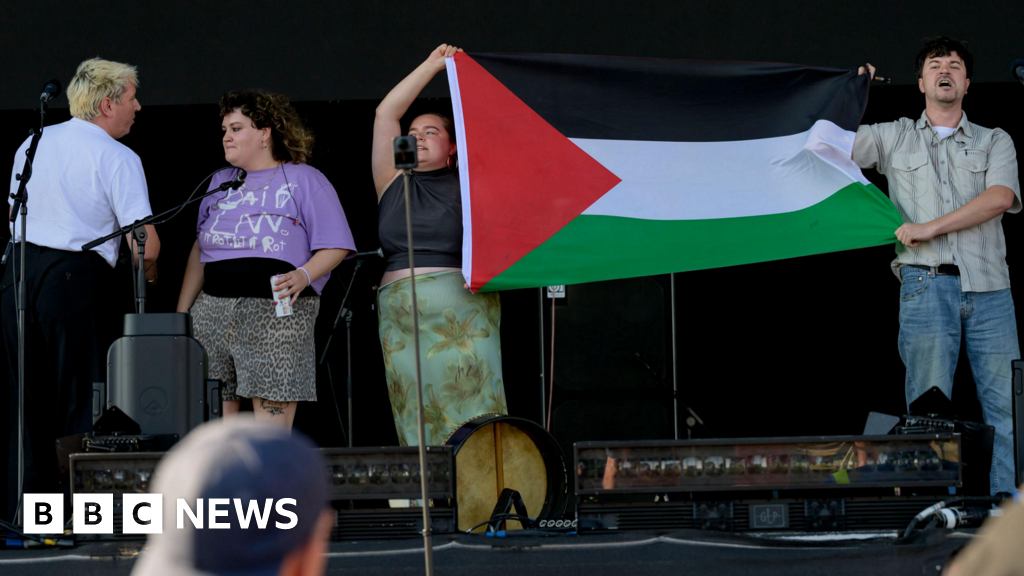Bands boycott music festival after group's set 'cut off'

```html Victorious Festival Faces Boycott After Palestinian Flag Incident
A wave of bands, including The Last Dinner Party and The Academic, boycotted Portsmouth's Victorious Festival on Saturday following allegations that Irish folk band The Mary Wallopers were "cut off" during their performance for displaying a Palestinian flag. The incident has sparked a debate about freedom of expression at music festivals and the complexities of navigating political statements within entertainment events.
The Mary Wallopers' Account and Initial Response
The controversy began when The Mary Wallopers claimed their set was prematurely ended after they displayed a Palestinian flag and chanted "Free Palestine." The festival initially stated that the band's set was halted due to a "discriminatory" chant, referencing the festival's policy against flags of any kind. However, the band refuted this claim, asserting that the sound was cut after the flag was displayed and the chant began. They posted a video appearing to show a crew member removing the flag and the sound subsequently being cut.
Band Boycotts and Statements of Support
Following The Mary Wallopers' account, several bands announced their withdrawal from the festival in solidarity. The Last Dinner Party, a rising rock band, expressed outrage at what they called "political censorship" in a statement on their Instagram page. Irish band The Academic stated they could not "in good conscience" perform at an event that silences free speech. Cliffords, another Irish band, echoed this sentiment, saying they "refuse to play if we are to be censored for showing our support to the people of Palestine."
Victorious Festival Apologizes and Pledges Donation
Facing mounting criticism, Victorious Festival issued an apology to The Mary Wallopers and pledged to make a "substantial donation to humanitarian relief efforts for the Palestinian people." In a statement, the organizers admitted they "didn't handle the explanation of our policies sensitively or far enough in advance to allow a sensible conclusion to be reached." They clarified that their policy against flags was in place for "wider event management and safety reasons" and not intended to compromise artists' freedom of expression. The festival conceded that the sound for the audience was cut, although mics remained live for longer.
Expert Perspective: Balancing Free Speech and Event Management
Dr. Eleanor Watson, a lecturer in cultural policy at the University of Sussex, commented on the incident, stating, "This situation highlights the delicate balance between an artist's right to express their views and a festival's responsibility to manage its event effectively. While festivals often have policies in place to ensure the safety and comfort of all attendees, these policies shouldn't be used to stifle legitimate political expression. The key is transparency and clear communication with artists beforehand."
Historical Context: Political Expression in Music
The intersection of music and political activism has a long and rich history. From Woody Guthrie's protest songs during the Great Depression to the anti-war anthems of the 1960s and the politically charged lyrics of punk rock, music has frequently served as a platform for social commentary and dissent. More recently, artists have used their platforms to address issues such as climate change, racial injustice, and geopolitical conflicts. However, the specific rules of music festivals, which are often privately owned, do create a complicated dynamic.
The Festival Continues Amidst Controversy
Despite the boycotts and controversy, Victorious Festival proceeded with its scheduled lineup, which included headliners Kings of Leon, Bloc Party, Gabrielle and The Reytons. The incident, however, has raised important questions about the role of music festivals in facilitating or restricting political expression and the responsibility of event organizers to navigate these complex issues with sensitivity and transparency.
Analytical Viewpoint: The Power of Collective Action
Music industry analyst Mark Reynolds believes that the collective action of the boycotting bands sends a powerful message. "This isn't just about one band being silenced," he explains. "It's about a community of artists standing together to defend freedom of expression. This kind of solidarity can have a significant impact on the way festivals operate and the policies they implement regarding political statements." He added that the incident could lead to a wider re-evaluation of festival policies and a greater emphasis on open dialogue between organizers and artists. ```
Originally sourced from: BBC Entertainment
